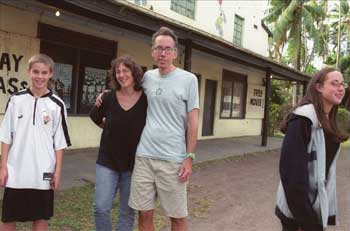 If you haven’t read Spike Mike Slackers & Dykes yet, I’ll wait while you click here and buy it through CHUD. The book is about John Pierson’s career as the Godfather of the indie film movement. He gave Spike Lee money to finish his first film. He discovered Kevin Smith, Michael Moore, Richard Linklater and more. The face of the indie film movement was, to an extent, shaped by Pierson.
If you haven’t read Spike Mike Slackers & Dykes yet, I’ll wait while you click here and buy it through CHUD. The book is about John Pierson’s career as the Godfather of the indie film movement. He gave Spike Lee money to finish his first film. He discovered Kevin Smith, Michael Moore, Richard Linklater and more. The face of the indie film movement was, to an extent, shaped by Pierson.
He hosted a show for IFC called Split Screen, and on one episode of this show he found the most remote movie theater on Earth – the Meridian 180 Cinema, on a tiny Fijian island, and right off the International Date Line. He showed a Three Stooges short featuring Pacific Islander cannibals, and the reaction was incredible and positive. Two years ago John moved his whole family there – wife Janet, daughter Georgia (16) and son Wyatt (13) – and spent a year showing free movies to locals. For the last month Steve James, director of Hoop Dreams, came to Fiji to document the family. The result is the hilarious and fascinating Reel Paradise.
Pierson showed a range of films, from The Matrix to Rabbit Proof Fence, and plenty in-between (including the ever controversial Jackass). In Reel Paradise we get to see the Fijians reacting to these movies innocently and fully – it’s exciting and recaptures the pure joy of going to the movies.
Last week I had a chance to sit down with Pierson (and Steve James – see my interview here). This was a big moment for me. I didn’t bother to transcribe the moment when I gushingly told John that the reason I was sitting at that table was Slacker, a movie he repped. But it’s true – the films that John Pierson championed were among the films that really changed my life. And now, as I see my position here at CHUD as a way to champion interesting films and filmmakers, he’s also become something of a role model.
John Pierson, it turns out, can talk. And talk he does. This interview easily ranks among my favorites. And as much as I respect Pierson and enjoyed Reel Paradise, I had to start the interview with a question I had heard bandied about, a question about the very purpose of the whole Fijian adventure.
Q: The year in Fiji – was that more for you or more for the Fijians?
Pierson: I would be curious what you have to say about that, but you’re interviewing me.
Q: I think it was a lot for you. And it felt like it was a lot for you in the same that the missionaries that go to these islands, they do it for themselves.
 Pierson: I wouldn’t really make a counterclaim to you. And the missionaries would undoubtedly say the same thing! But it’s a two way street, and here’s how I would argue that – yeah, there was nothing that gave me more pleasure than seeing an audience in the 180 Meridian Cinema having a great time at a movie. By definition if the thing that gave me the most pleasure was seeing that audience have a great time, I think that’s mutually beneficial.
Pierson: I wouldn’t really make a counterclaim to you. And the missionaries would undoubtedly say the same thing! But it’s a two way street, and here’s how I would argue that – yeah, there was nothing that gave me more pleasure than seeing an audience in the 180 Meridian Cinema having a great time at a movie. By definition if the thing that gave me the most pleasure was seeing that audience have a great time, I think that’s mutually beneficial.
Other people might say, Well you spent X amount of money, you could have done something that would have been of more tangible usefulness. Like in Portland Oregon, which I have now declared to be the most politically correct city in America, because they recycle the most garbage, Georgia was with me on this 14 festival spree since Sundance (and she had the best time of her life, because she likes to mix it up as you can tell from the film. Sometimes more intelligently, sometimes less intelligently, but she loves to mix it up), we had a withering barrage of three consecutive assaults. They just happened to be women. One of them was like, you should have taken cultural sensitivity training before you went. The next one went, you should have done something useful for the community there like build a health clinic. The third one was just so horrified when I introduced these two guys from Jackass who live in Portland that as she was going up the aisle to bolt out the door, she turned in my general direction and said, “Boo to you! And everything you did!”
But the middle one, the health clinic, is interesting. Because they had a hospital, you see it in the movie. It was built with Australian aid money. There’s some do-gooders for you. And it’s great there is a hospital. And if you look at the treatment you see me get[when he gets dengue fever in the film], you might even imagine the hospital functions. Which is kind of does, on the rare occasions when they can get a doctor to come there and stay there. They can’t staff it. Nobody wants to be stuck in that hospital. Which is nice for us because they had to whip in this series of interns from Yale medical school who were all pretty entertaining people who loved coming to the movie theater. It all kind of worked out!
But I don’t really know whether your meaning would be that if I was going to be involved in a cultural exchange, should I have provided something of more substance with what I was bringing. The answer to that winds up being – I could do it seriously, but I love telling the story of what I showed the first night I had a free movie versus what they showed the night before, because the theater had been operating for fifty years. PS, the first movie they showed there when it opened in 1954 was Burt Lancaster in His Majesty O’Keefe, which was partly shot in Fiji. At any rate, The Fast and the Furious was the first movie I showed, and it was months before my family came out, it was the middle of February, 2002. The night before, the last movie shown not for free at the Meridian Cinema, was Scary Movie 2. Who’s poisoning the culture more? Me or the previous owners?
Q: I don’t think you’re poisoning the culture at all. To get back to the hospital, in the film you reference Mosquito Coast, the Paul Theroux book-turned-movie. I’m reading his new travel book, where he’s in Africa –
Pierson: Dark Star Safari. I love that book. It’s fantastic. Did you read the Pacific one as well? That was one of my source books when I went out to Fiji. I loved that book, but he didn’t like Fiji. He had an infection in Fiji if you remember. A very personal infection.
Q: In Dark Star he talks about how all the aid that is poured into Africa doesn’t do anything. You build a hospital and the hospital withers away because no one maintains it. So I don’t think you should have done something like that. And I also don’t think you should have brought better pictures. But I guess the question is – what did you want to bring to the Fijians?
Pierson: I wanted to – honestly, and if this just makes it for me, then it was all for me – I wanted to bring more nights like that Three Stooges moment. I wanted to try to understand for myself – and this is where I didn’t gain so much for myself – I wanted to try to understand for myself on a more analytical level what it was that people took away from that movie watching experience. But that degree of articulation is not a characteristic you would generally find in the Fijian population.
Q: I’ve seen about 75 movies so far this year, and there gets to be a point where I just dread going to see another movie or two, night after night. I walked out of this film remembering why it was that I went to the movies in the first place, why I got interested in them. And it wasn’t necessarily for the heartbreaking tale of forbidden love between outlaws against society and whatever, it was about having a great time in a theater full of people. Was that something you needed to recapture?
Pierson: Completely. I was just thinking about this – that’s probably why, as people are struggling with what’s gone wrong with the theatrical experience in America (and that’s if something has gone wrong besides some measurable box office percentage decrease), even when a theater is full now, you still don’t feel like it’s a community, you feel like it’s just a bunch of people. You’re concerned with how other people are behaving badly. At the 180 we didn’t have to worry about that. We had very few rules. You had to be in your seat. Don’t throw trash out the window – that really bugged me. I would actually run around outside to throw it back in, but I wouldn’t know if I hit the right person. Don’t put rocks in the toilet. That was the third thing.
Q: Why would they do that?
Pierson: Great country, great island, great people. But just mischief. I don’t know what else to say. 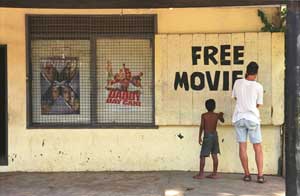 Certain boys at a certain age can’t help themselves. They wouldn’t normally put rocks in a toilet, they would put rocks through your window. There’s no glass that’s not unbroken. There’s not a single unbroken pane of glass on the island. It’s all behind that grid stuff – which is why our showcases looked so crappy!
Certain boys at a certain age can’t help themselves. They wouldn’t normally put rocks in a toilet, they would put rocks through your window. There’s no glass that’s not unbroken. There’s not a single unbroken pane of glass on the island. It’s all behind that grid stuff – which is why our showcases looked so crappy!
But that’s what I feel that theater provided for me – community. It made me realize clearer than ever that maybe as opposed to a Hollywood film, I think that is where the independent world can take a certain pride. I think the film festival audiences – even if they can be a little hoity toity about it – film festivals are a bonding experience. The same thing for certain special theaters. I’ll give out a shout out – even though we’re playing at the IFC in New York – a shout out to the Film Forum, for having a certain communal bond in that audience. Or in my geek home town now, the Alamo Drafthouse.
Q: What a great theater.
Pierson: You see that picture in Entertainment Weekly of all those people wearing the caps for The Life Aquatic and you know, that’s a little scary but that’s really great!
Q: Last December I went to Harry Knowles’ 24 hour Butt-Numb-A-Thon there, and that was insane, but it’s a community. You’re locked in there for 24 hours and you’re experiencing movies together.
Pierson: The difference is that people who are involved in something like that will wind up talking about it for a long time after. It’s a much more innocent thing at the 180 Meridian Cinema. People will have a great time at whatever it is that night, The Scorpion King or The Hot Chick or Bend it Like Beckham, and then it will be over. They’ll do it again the next night. They’ll get the word out – the word will travel the island. The phrase they use there, and if I write book about this one day this is what it’ll be called, is “coconut wireless.” So the word did get out but not through endless kinds of conversations or emailing back and forth or websites – there was no such thing. It would just be like, “See this.” That was it.
Q: Are you considering not writing a book? Because it seems to me that it would be terrible to lose the other eleven months that were not documented.
Pierson: What happened is that I fell in love with an idea that on a practical level is really hard. I love my family – each and every one of them dearly. I thought a fun book for readers would be a book where all four of our voices were involved. But I’ve got two kids, one who hates to write even though she’s a good writer, and one, Wyatt who, in typical fashion, will write exactly as many pages as you tell him to for the money. Janet’s a wonderful writer as well, but we’ve had a hard time sifting through how to have a balancing act and how to have everybody pull their weight. And how to – not to criticize Janet – but to have nobody pull too much weight because she’s written a lot. I would love to have that but in the meantime I have pushed on from doing my own. I could have sat down and did it whenever, but now I won’t. I’m not an individual free agent.
Plus there’s teaching all those damn film classes at UT!
Q: How is that?
Pierson: It’s good, but it’s a great excuse for not doing other things. I’m like, “I’ve got notes! I’ve got notes to make!” One of those classes didn’t have a syllabus last semester, so I guess I’m getting away with murder.
My little advanced producing class – we represent a little film that played South By and LAFF called Cavite, which might actually make the New York Film Festival. These Phillipino-Americans shot this film for nothing around Manila. It’s got a cell phone plot line and a terror plot line and it’s fucking great. This little ten thousand dollar film. I have this little class of 20 and I don’t rep films anymore – but my class does!
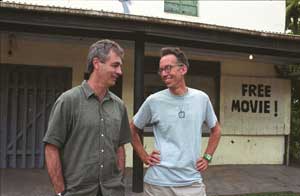 So what we did is that we helped to shape the final editing. We went through the press and distributor experience at South By and LAFF, and people loved it. It’s just great.
So what we did is that we helped to shape the final editing. We went through the press and distributor experience at South By and LAFF, and people loved it. It’s just great.
Q: That’s my next question for you – I got this DVD in the mail, a Seattle filmmaker sent me his movie. It’s a rough cut, it’s not mixed, but it’s really good. It’s a small film, with no one you ever heard involved in it. He wants to get it in Sundance. Is there a place for films this small anymore on the big festival circuit?
Pierson: I think Cavite – which got turned down by Sundance, but I think Geoff Gilmore will one day, since he’s had a DVD from me for a while, one day he’ll watch. It’s really short, only 79 minutes, he can even watch and eat lunch! He’ll watch and he’ll kick himself, because that could have been this year’s Primer, but better. Not that there’s anything wrong with Primer, but it’s a very impenetrable film for most people, and this is a very relatable film. It’s a thinking person’s indie thriller.
I do believe there’s a place, but unfortunately I think the way the media works there’s not a place for too many of those films. Sundance didn’t really have one this year. Police Beat, by default was that film. It’s really beautiful, a kind of semi-experimental kind of films, but it wasn’t one of those – one of those first features, made from spit, “How did they figure out how to make that?” film. It was more elegant.
Q: I keep seeing these films that are being passed off as indie films that are 5, 10 million dollars, readymade for Focus Features. But you think there is a place for the low, low budget, no stars films?
Pierson: A select few. I think all the elements have to come together. And it really has to happen in the press, they have to decide that this is the one. I don’t think that people can deal with that on a week in/week out basis like they might have been able to in ’94.
Q: Once upon a time it felt like that was everything you came across, though. What’s changed since ’94?
Pierson: Now it’s a category. You weren’t even on the high end of the spectrum, you were on the middle end of the spectrum, all the way down to the Primers and the Tarnations… there’s room for just so many of those. Everybody has that impulse, like when Miramax bought Clerks and became a different company, everybody has this impulse to still want to hold on. You can see that when you see the New York Times critics blogging from Cannes, wondering why this film or that film can’t get picked up, and then bragging when they do. But it’s only a percentage. You’re right, it would have been a much bigger percentage once.
Q: Shouldn’t we be living in a world where that is a much bigger percentage? Wasn’t that the theory in the indie boom?
Pierson: No, we’re supposed to be living in a world where those films that you’re seeing and liking wouldn’t need to go through the enormous high expense of releasing them theatrically. That’s the problem – they don’t cost any less to release just because they cost less to make. That’s where the logic really tumbles.
Something with us, Reel Paradise. We’re trying to be modest. Same thing with Cavite – whoever picks up that film… it’s a pity because it’s a prototypical visual film, it’s ridiculous that it would ever have to go to 35mm film stock. That’s because Landmark – and God bless them for being an art film chain – because Landmark is owned by a digital initiative company and has hardly gone digital anywhere. If you want to release something in a meaningful way anywhere, you still have to go to film.
Q: I was talking to Georgia and Wyatt outside. Georgia hates the movie.
Pierson: She often says that.
Q: Do you hate the movie?
Pierson: No. I hate that she hates the movie.
Q: Do you feel you were properly portrayed?
Pierson: For that month – I’ll tell you this: if there hadn’t been a film under way and I got dengue fever, I would have just checked into the hospital. But the show must go on, and that certainly tried my patience. But I don’t mind being the character I am in the film. Janet would be more defensive on my behalf than I would be on my behalf.
I hope that more people do than don’t get Georgia. Number one, she’s acting her age. Number two, I think 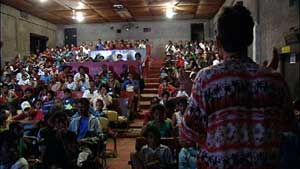 the way she fit in there is great.
the way she fit in there is great.
The thing that’s missing for me is John the guy alone. What’s really funny is that the best way to go to Fiji – here’s some advice if you go – is to certainly not plan on getting any work done. If you’re going there with no worries, it’s a great, great place. As soon as you have a business – and I’m sorry, the movies were free but it was a business – as soon as you’re trying to do something, to run a business or accomplish anything that doesn’t involve just a pen and a notebook or paint and a canvass, you’re in for a rocky road. My missing peer group in the film is the other handful of people – and not so much ex-pats either, but actual Fijians and Indo-Fijians – who were trying to do business on that island. We had a little Rotary Club. Those were my peeps. Partly because it wasn’t as big an interest to Steve, and partly because it was near the end and partly because those people weren’t keen on being in the film, that was hardly shown at all. I wouldn’t mind if you saw me kind of unwinding with those guys.
Q: You said that you stopped repping films, but it doesn’t seem like that’s really true.
Pierson: I did. Ten years ago.
Q: But you seem like the kind of person who can’t help but get excited about movies and help them out.
Pierson: Oh, I’ll help people. That’s cool. Even with the Cavite thing, even when the guys who made it say “Hey, John is repping the film!” I say, “Don’t say that. John’s class is repping the film. Under John’s guidance.” And yeah, I’m taking the lead. But it’s like the greatest class project ever. The fall class of course has to continue to follow through with it. Will the fall class also look for another film? That would be great. And is this a way of keeping a hand in? Sure.
And in terms of helping people – whenever I have time in my life to watch stuff, I almost never say no. I won’t read scripts unless it’s someone I know, but in terms of people with movies that they really, really, really, really for one reason or another want me to see – if they can deal with the fact that if I don’t care for it I won’t even talk to them about it, I will watch it. Time is short, not just this week, but time is short forever. But I’m open to watching almost anything people think they really need me to watch. I’m still flattered.
I hope there are some people who still really care about the films they put their fingerprints on. I know it’s not like you made it, just because you helped it get a deal or distributed.
Q: That’s a fascinating relationship. What is the level of ownership that you feel over something like Clerks?
Pierson: Well, since Kevin and I are, I hope, lifelong friends, I think both of us feel that – I didn’t make the film, but I did tell him how to change his ending, so I feel like I had a miniature bit of authorship for that movie. I certainly feel like it’s possible that it could have somehow slipped through the cracks. But I never pretend that I made it.
That wasn’t even my money, though.
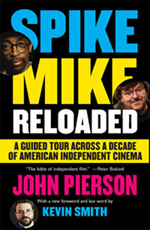 Q: As opposed to She’s Gotta Have It.
Q: As opposed to She’s Gotta Have It.
Pierson: Or Go Fish, or a lot of films. Or Blair Witch.
It’s funny – Blair Witch is officially just something we did on the TV show, something we gave money just for being on the TV show – and whenever anybody says, “Hey what else did those guys ever do,” I take umbrage at that – but there’s something that feels very right to me that they supported the Meridian 180 Cinema project. I feel, if I’m ever going to talk about the non-repping years and the film I feel like I should have had a piece of – there you go! Possibly The Blair Witch Project?
Q: If there never is a Fiji book, will there be other writing from you? Spike Mike is one of my favorite film books.
Pierson: Thank you for saying that. It’s nice to be able to assign that to a large class of producing students, I can be guaranteed that much of a royalty every year forever. Yeah, I don’t think I’ll write another film book. I don’t feel like I would want to do that.
Q: Is there a novel in there? Is that what you’re hinting at?
Pierson: I wish! I guarantee you that if there’s no Fiji Pierson Family book, that material will turn into something. It’s a great backdrop, and I’d like to set a movie there. A fiction film. Many people have come to me with ideas for that, but none have been very good so far. I don’t think I would write the screenplay, but I think I could come up with a story idea.
Q: You wouldn’t direct it?
Pierson: Nah.
Q: Why not?
Pierson: Never wanted to.
Q: Never?
Pierson: I picked some camera angles on the TV show, that’s about it.
Q: Are you happy with your place in history?
Pierson: OK, this will be the most presumptuous and pretentious answer. Or it could be, but I’m only going to go halfway there for you. I’m totally into this test of time thing for art, so what I’m really happy about is whatever I did or didn’t have to do with these films finding a place in the world, I’m really happy that a number of the films I feel like I championed – at the very least – have found their way into film history. When the Slacker Criterion DVD came out last year, yeah, that felt awesome. We just renewed the She’s Gotta Have It deal with MGM – and for a very handsome amount of money! Keep those license terms short, people! The 20th anniversary DVD comes out next summer – which is first of all, God, 20 years! The fact is that to me Roger and Me is still Michael’s best film, in my considered opinion. I don’t care if Fahrenheit 9/11 made 120 million dollars, in terms of influencing documentary filmmaking, obviously that is one of the key movies of our lifetime. If there are 8 more DVD editions of Clerks I might burn out around 6, but I do feel great about that. I do feel that because they have a place in the history of independent film and perhaps film, and because their makers have gone on to accomplish what they have to this day… and by the way, it’s a great pleasure to live in Linklater’s town. It’s great to see him.
Q: His career is so great. It’s the perfect career.
Pierson: If I provided some guidance in helping him do that, or if I enabled him – OK, enabler, there’s another word you can use. Champion enabler. Yeah, I feel great about that. In the same way that I, like many people, want to accentuate the positive it’s very pleasurable to see other big moment, big indie watershed films that we won’t name, get forgotten really quickly.
I wouldn’t necessarily know on my own what the value of my book was to other people, but I hear about it a lot. I know Hyperion published a Tim Allen book at the same time, which really sold a lot of copies. I remember at the time, we were selling 20,000 and he was selling 500,000 – but you know what, nobody has a fucking clue about that Tim Allen book ten years later.
Q: And you have the new edition.
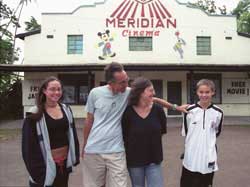 Pierson: It was funny about the new edition. I did it when I did because of Peter Biskind’s book, but now already I probably would have done it differently. I actually think that’s another one – Peter, you don’t talk to me anyways, so I don’t care! I think Down & Dirty Pictures is one that’s going to be forgotten. It’s not going to last.
Pierson: It was funny about the new edition. I did it when I did because of Peter Biskind’s book, but now already I probably would have done it differently. I actually think that’s another one – Peter, you don’t talk to me anyways, so I don’t care! I think Down & Dirty Pictures is one that’s going to be forgotten. It’s not going to last.
Q: It’s a sloppy book.
Pierson: It’s a redundant book and it’s filled with a basic disregard for the movies he’s writing about. The Harvey stuff aside, he doesn’t really like his subject. Easy Riders Raging Bulls, on the other hand, that’s forever.
But hey, the film out of all those that I wish had gotten it’s due, and the director’s been self destructive, so I guess it’s a little bit his fault, but Laws of Gravity is a really good film. Despite its Mean Streets derivations, if you look at who’s in that movie – well, Peter Green’s also flamed out! So the Nick Gomez/Peter Green flameout duo… I don’t know that for sure about Nick. But Peter did. Peter had some trouble, and Nick had some too.
But that’s the one. But every time there’s a new Eric Schaeffer TV show – and this new one, Starved, is like six or seven! -but it’s funny, because the first point of identification for him is STILL My Life’s In Turnaround. And I like that movie too! It’s just funny for me that there would have more recognition in the world for My Life’s In Turnaround than for Laws of Gravity.